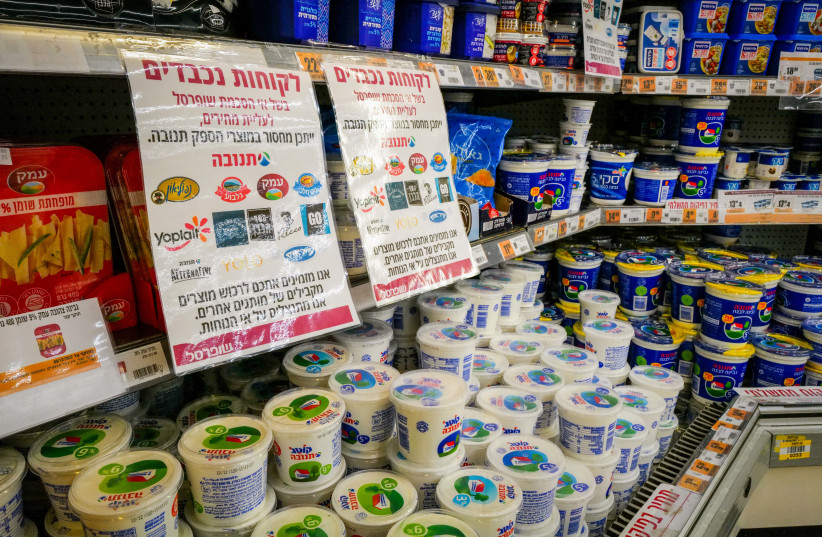Electricity prices are about to go up in a few weeks by 8.2%. Water prices will soon follow as a result and are expected to go up by 3.5% as a first stage and likely more as the new year progresses.
Last week, the price for a liter of gasoline went up 39 agurot, putting the minimum price for a liter of 95 octane petrol at NIS 6.85.
And then there was the decision on Thursday by leading Israeli food manufacturer Strauss to raise the price of several of its products later this month by 2.9%, directly affecting the cost of dairy products, dips, salty snacks and sweets.
Strauss noted its attempts to prevent the increase, stating that the decision was made “After 12 years in which it avoided raising prices in Israel, and after significant efficiency measures.”
The company stated that the increase in price comes “following a tens of percent increase in the prices of raw materials, energy, packaging and other [resources], the extent of which is estimated to have an impact of approximately NIS 300 million.”

Strauss’s decision came just three weeks after Tnuva announced that it will increase the prices of dairy products that are not government controlled by an average of 4.7%, with a maximum raising of 4.9%.
Among the giant food producer’s dairy products whose prices went up were cheese, butter, milk-based drinks and yogurts. Although they do not contain milk, the price of Tnuva’s milk substitutes also increased, including soy drinks, oat drinks, tofu, vegan cheese and vegan yogurt.
Tnuva said that the increase was proportional and was made in light of the significant price increase in raw materials – primarily milk, which has gone up by 24% since 2019.
Prices soar in almost every sector
And this is without even getting into the issue of housing, which is beyond the reach of most Israelis who cannot afford to buy an apartment and either live perpetually in rentals or in debt due to loans and mortgages they need to take to purchase a basic necessity.
Benjamin Netanyahu, the designated prime minister, said during his campaign that the cost of living would be one of the new government’s most important issues. There is no doubt that it should be – but that does not coincide well with his decision to split the four-year term of the next finance minister between two politicians with diametrically opposed economic philosophies.
Religious Zionist Party head Bezalel Smotrich, who will serve for the first two years as finance minister, is a proponent of the free market (even though he did raise concern when saying that the Torah will also be used to set policy). Shas leader Arye Deri, who will rotate into the office after two years, is more of a socialist who believes in significant increases to social welfare, subsidies and food stamps. Smotrich will do everything to generate growth and jobs, while Deri will come in and do the opposite.
This is assuming that something even happens in the ministry during his first two years in office. Usually, plans take time to be approved and implemented. By the time Smotrich’s policies take effect, Deri will be taking office to overturn them.

This ridiculous situation will do nothing to advance Israel’s diplomatic or economic standing in the world. There is a genuine concern in economic circles of a possible rating downgrade if there is a sense among international rating firms that Israel does not have fiscal responsibility and mature economic policy.
Netanyahu should know this. In his recently-published autobiography, the incoming prime minister writes with great pride about the key role he played in reforming and privatizing Israel’s economy. It was, he explains in detail, the reason he voted several times in support of the 2005 disengagement plan and withdrawal from the Gaza Strip.
Now he needs to stand by his campaign promise and take steps to lower the cost of living while at the same time ensuring responsible fiscal policy. Israel’s economy needs to be safeguarded and protected while decisions are made to benefit average citizens and improve their quality of life.
So far, based on the coalition negotiations, the opposite interest seems to be guiding Netanyahu and his new government. We hope that will not be the case.
